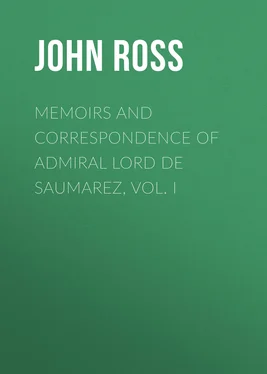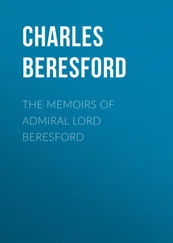John Ross - Memoirs and Correspondence of Admiral Lord de Saumarez, Vol. I
Здесь есть возможность читать онлайн «John Ross - Memoirs and Correspondence of Admiral Lord de Saumarez, Vol. I» — ознакомительный отрывок электронной книги совершенно бесплатно, а после прочтения отрывка купить полную версию. В некоторых случаях можно слушать аудио, скачать через торрент в формате fb2 и присутствует краткое содержание. Жанр: foreign_prose, foreign_antique, на английском языке. Описание произведения, (предисловие) а так же отзывы посетителей доступны на портале библиотеки ЛибКат.
- Название:Memoirs and Correspondence of Admiral Lord de Saumarez, Vol. I
- Автор:
- Жанр:
- Год:неизвестен
- ISBN:нет данных
- Рейтинг книги:3 / 5. Голосов: 1
-
Избранное:Добавить в избранное
- Отзывы:
-
Ваша оценка:
- 60
- 1
- 2
- 3
- 4
- 5
Memoirs and Correspondence of Admiral Lord de Saumarez, Vol. I: краткое содержание, описание и аннотация
Предлагаем к чтению аннотацию, описание, краткое содержание или предисловие (зависит от того, что написал сам автор книги «Memoirs and Correspondence of Admiral Lord de Saumarez, Vol. I»). Если вы не нашли необходимую информацию о книге — напишите в комментариях, мы постараемся отыскать её.
Memoirs and Correspondence of Admiral Lord de Saumarez, Vol. I — читать онлайн ознакомительный отрывок
Ниже представлен текст книги, разбитый по страницам. Система сохранения места последней прочитанной страницы, позволяет с удобством читать онлайн бесплатно книгу «Memoirs and Correspondence of Admiral Lord de Saumarez, Vol. I», без необходимости каждый раз заново искать на чём Вы остановились. Поставьте закладку, и сможете в любой момент перейти на страницу, на которой закончили чтение.
Интервал:
Закладка:
At ten minutes past six, the signal for the line of battle abreast was made, which allowed the headmost ships to take in small sails; and immediately after another signal was given for the Dolphin and Preston to change stations; this was a serious mistake, as it led our squadron to believe that the admiral meant to engage the ship ahead of the Dutch admiral, and not that of the latter, which was actually his intention. This unfortunately placed the Dolphin in opposition to one of the largest of the enemy's vessels; and while it left the rear-ship (the Bienfaisant) for some time without an opponent, the van-ship Berwick and the Dolphin had to engage three of the enemy.
In the mean time, the Dutch were regularly drawn up in a line of battle ahead, on the larboard tack, the ships being about a cable's length apart, and keeping a point from the wind, with their sails well proportioned to each other. They appeared in excellent order, their hammocks stowed, and marines drawn up on the poop.
At fifty-six minutes past seven, the signal for close action was made, and, to the astonishment of our squadron, the enemy never fired a shot, although they might have done considerable damage to our ships had they opened their fire on them as they approached end on to them, on their weather beam. Not a gun was fired on either side until within half-musket shot, when the red flag was hoisted on both ships. Up to that moment all was silent, and it is scarcely possible to conceive a silence more solemn and impressive! At the same instant, they saw the signal go to the mast-head of Zoutman's ship. The dreadful silence was now broken by the tremendous roar of cannon when within pistol-shot, and the battle raged with the utmost fury for three hours and forty minutes.
At ten o'clock, the signal for close action which had been made, was repeated. The Berwick, having forced the van-ship of the enemy to edge off, fell to leeward of the line, and was consequently obliged to make sail, tack, and regain her station in support of the Dolphin, which had then two ships on her, and was also thrown to leeward. The admiral, having now slackened the Dutch admiral's fire, passed ahead of the Buffalo, on which the ships astern closed up to the Buffalo; and the Berwick took the station ahead of the admiral. At thirty-five minutes past eleven, the ships became unmanageable; and, the Dutch dropping to leeward, the action ceased.
By some it has been affirmed that Admiral Parker should have renewed the action: Lieutenant Saumarez says, it was certainly his intention to do so; but the state of his own ship, and the reports he received from others, rendered it quite impossible. 3 3 When the action had ceased, Sir Hyde Parker, captain of the Latona and son of the admiral, bore down on the Fortitude, and affectionately inquired for his brave parent, of whose gallantry he had been an anxious eye-witness. The admiral, with equal warmth, assured his son of his personal safety, and spoke of his mortification at being unable, from the state of his own ship, and from the reports he had received of the other ships, to pursue the advantage he had gained, in the manner he most ardently desired.
The Dutch convoy had about the middle of the conflict bore up for the Texel. The protection of them was no longer an object, and Admiral Zoutman, as soon as he could possibly get his ships collected and put before the wind, made the best of his way into the port; but during the night the Hollandia, Dutch seventy-four, was seen sunk in twenty-two fathoms water, and her pendant was hauled down by Captain Patton, of the Belle Poule, and brought to the admiral. As no ship was taken, both claimed the victory: but, the convoy being sent back into port and one ship sunk, should certainly decide it to Admiral Parker; and had the English admiral not inadvertently rendered his van too weak by the mistake in the signal which also extended his line beyond their rear, thereby rendering one ship for a time useless, he would have obtained a decisive victory.
While Admiral Zoutman must be admired for his cool intrepidity, it must be admitted that he was much to blame in forbearing to avail himself of the opportunity of attacking and disabling the approaching fleet, which he might have done with great effect. After the Fortitude had been put into a condition to make sail, Lieutenant Saumarez was sent to conduct the Preston, one of the disabled ships, into port; her commander, Captain Græme, having lost his arm in the action. When Admiral Parker arrived at the Nore, his Majesty paid the squadron a visit; but the veteran commander, indignant at the conduct of ministers, who, he conceived, ought to have reinforced his squadron instead of allowing some fine ships to lie idle in port, received the King with that rough hauteur peculiar to himself, observing, "I wish your Majesty better ships and younger officers. As for myself, I am now too old for the service."
On this occasion Lieut. Saumarez was presented to George III. The King inquired if he was related to the captains of the same name one of whom had circumnavigated the globe with Anson, and who had fallen gloriously in the service of their country: the admiral replied in the affirmative, saying, "Yes, please your Majesty; he is their nephew, and as brave and as good an officer as either of them."
In consequence of the bravery and skill he displayed in this action, Lieut. Saumarez was promoted to the rank of commander, although only second lieutenant; the first being wounded early in the action, the duty had fallen on our hero: and he was immediately appointed to the Tisiphone, a fire-ship constructed on a new plan, and armed with carronades, which was then fitting at Sheerness; his commission as "master and commander," bearing date for that ship, the 23rd August 1781.
When lieutenant of the Fortitude, with Admiral Sir Hyde Parker,—who, from his acerbity of temper, was distinguished from others of the same name by the sobriquet of "Vinegar Parker,"—the old admiral betrayed his ill-humour by unwarrantably finding fault with him one morning when Mr. Saumarez commanded the watch; but soon after, probably to make amends for such hasty and unguarded conduct towards an officer for whom he had the greatest regard, he sent to invite him to dinner, an honour which the young lieutenant declined in terms sufficiently strong to indicate that his feelings had been hurt. On this, the admiral sent for him and exclaimed, "What! can't you put up with the fractious disposition of an old man?" The admiral, who could not bear to be, even for a day, at variance with Lieutenant Saumarez, would do anything to serve him; and, when he obtained the command on the East India station, offered to take him with him in the Cato, which sailed, and was supposed to have foundered off the Cape of Good Hope, as she was never afterwards heard of; and he happily escaped sharing the fate of that gallant chief and unfortunate crew.
The Tisiphone having been fitted out at Sheerness, and the complement of men having been filled up by supernumeraries from the Conquestadore at the Nore, Captain Saumarez, by order from Admiral Roddam, placed himself under the command of Captain Allen, of the Sceptre, on the 6th September 1781, from whom he received the following order:
You are hereby required and directed to put yourself under my command, and to follow all such orders and directions as you shall from time to time receive from me for his Majesty's service, and to hold yourself in constant readiness to sail at a moment's warning; and in case of separation by any unavoidable accident, you are to make the best of your way without loss of time to Torbay, and put yourself under the command of Admiral Darby.
(Mem.) In case of your parting company with his Majesty's ship Sceptre, and falling in with any ships or vessels belonging to France or French subjects, Spain or Spanish subjects, the States General of the United Provinces, or to his Majesty's rebellious subjects in the colonies of North America, that you can cope with, you are to use your best endeavours to take, seize, sink, burn, or destroy the same: giving me an account of your arrival at Torbay, and of anything you may have so taken or destroyed.
Читать дальшеИнтервал:
Закладка:
Похожие книги на «Memoirs and Correspondence of Admiral Lord de Saumarez, Vol. I»
Представляем Вашему вниманию похожие книги на «Memoirs and Correspondence of Admiral Lord de Saumarez, Vol. I» списком для выбора. Мы отобрали схожую по названию и смыслу литературу в надежде предоставить читателям больше вариантов отыскать новые, интересные, ещё непрочитанные произведения.
Обсуждение, отзывы о книге «Memoirs and Correspondence of Admiral Lord de Saumarez, Vol. I» и просто собственные мнения читателей. Оставьте ваши комментарии, напишите, что Вы думаете о произведении, его смысле или главных героях. Укажите что конкретно понравилось, а что нет, и почему Вы так считаете.












